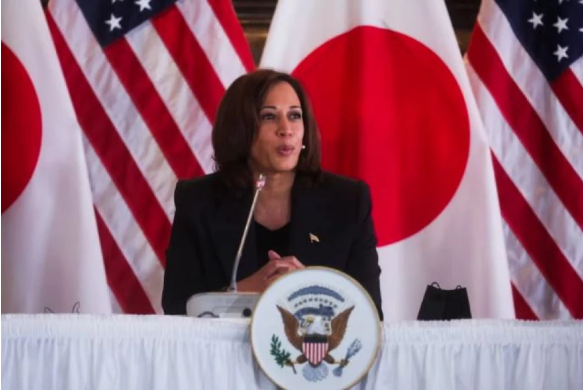More Japanese companies believe that a Kamala Harris presidency in the U.S. would be more beneficial for their businesses than a second term for Donald Trump, according to a Reuters survey released on Thursday. The survey highlights concerns among Japanese firms about protectionism and unpredictable policies.
The outcome of the upcoming U.S. presidential election in November is being closely monitored worldwide, especially in Japan, a key U.S. ally with tens of thousands of American troops stationed there. Japanese businesses, which rely heavily on trade with both the U.S. and China, could be significantly impacted by a renewed U.S.-China trade war.
According to the survey, 43% of Japanese firms favored Harris based on their corporate strategies and business plans, while only 8% supported Trump. Another 46% of respondents said either candidate would be acceptable, and 3% expressed a preference for neither.
A manager at a ceramics manufacturer commented, “There is a possibility that trade war, economic friction, and security threats will arise under another Trump administration, forcing us to alter our business strategy.” Japan’s relationship with the Trump administration was occasionally strained by his demands for increased payments for military assistance and trade tensions.
An official at a chemicals firm noted that with Harris, “we can expect current policies to be largely maintained, giving us better visibility into the future.”
When asked what changes might be necessary under a Trump administration, 34% of respondents indicated they would need to review their foreign exchange strategy, 28% said they would realign their supply chains, and 21% mentioned they would reduce their operations in China. Trump has proposed a 10% universal tariff on U.S. imports and a minimum 50% tariff on Chinese goods, which could disrupt international markets.
Nikkei Research conducted the survey on behalf of Reuters, reaching out to 506 companies between July 31 and August 9, with 243 firms responding.
Regarding operations in China, regardless of the U.S. election outcome, 13% of Japanese companies are considering reducing their presence in China, while 3% are looking to expand, and 47% plan to maintain their current level of operations. Among those planning to downsize in China, 35% cited a lack of economic recovery prospects, 29% pointed to tough price competition, and another 29% highlighted economic security risks.
China’s economy grew slower than expected in the second quarter, and its exports in July increased at their slowest rate in three months, raising concerns about the outlook for its manufacturing sector. Major Japanese companies like Honda Motor and Nippon Steel have announced plans to reduce their operations in China in recent months.
The survey also revealed that 24% of respondents considered the recent interventions by Japanese authorities in the foreign exchange market to be appropriate, while 9% viewed them as inappropriate, and 64% believed they were unavoidable.
Earlier this year, despite interventions in April and May, the yen continued to weaken, reaching a 38-year low of 161.96 to the dollar on July 3. It is suspected that Japanese authorities intervened again in mid-July to stabilize the yen.
An official at an electronics company remarked, “The extreme weakness in the yen had to be corrected. It was inevitable.”
When asked whether the Bank of Japan should raise interest rates to support the yen, 51% of respondents said such a move should only be considered if exchange rates fluctuated excessively, while 22% opposed any monetary policy changes aimed at influencing the foreign exchange market.
Regarding expectations for the yen, 32% of respondents predicted it would trade in the range of 145 to 150 yen to the dollar by the end of the year, 25% expected it to be stronger at 140 to 145 yen, and 22% foresaw it trading between 150 to 155 yen.
During the survey period, the yen was volatile, briefly reaching its strongest level of the year before reversing course and continuing to weaken.



